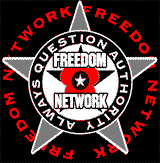 Freedom Network - MANIPULATING THE MEDIA!
Freedom Network - MANIPULATING THE MEDIA!
FACE-TO-FACE PRESS WORK
At an event, have a couple of spokepeople present who can meet and deal with the media. They should be: - informed ( fully briefed about not just the event but also able to give full & accurate details of the CJA itself) - representative of the campaign ( the anti-CJA campaign is so diverse that it's good to include people from a range of backgrounds who can give examples of their own experiences).
If you're doing something slightly risky, eg. squatting a building, be aware that in the past the police have been known to cut off the occupiers from contact with the outside world (including the press waiting on the steps!). In this kind of situation, it's a good idea to have a staffed 'office' phone and keep the spokesperson who will be dealing with press enquiries fully up-to-date (consider borrowing/ blagging a mobile phone)
PRESS RELEASES
These are the best way to communicate with the media. Split into 3 types:
* proactive: inviting them to events, giving clear times & background details.
* reactive: sent out during or after an event, reporting it & giving factual details.
* responsive: responding to other events relevant to the campaign.
Send out press releases for planned demonstrations in plenty of time. A telephone follow-up can be useful to check that they are covering the story and ask if they need any more information.
THE PRESS RELEASE ITSELF
* Mark "PRESS RELEASE" clearly at the top - plus your group's name and a logo if you use one.
* Next, the DATE, and either "FOR IMMEDIATE RELEASE" or a date "embargo" ( you specify how long it should be held back before being printed - take care: if you give the media full details of your plans in advance they may betray that trust).
* Use a snappy headline - straight to the point.
* In the 1st paragraph - the essentials, ie WHAT is happening, WHY, WHEN and by WHOM. Make it interesting, and this will convey the facts.
* Press releases should be short, factual & professionally written ( avoid spelling or grammatical mistakes & jargon which might not be understood).
* Keep it short ( preferably one page, but two at most). Keep sentences simple, and paragraphs short. It must be legible. ( A word-processor is invaluable; otherwise type it double-spaced).
* It's good to use a quote from an identified campaigner ( somebody locally famous perhaps).
* Write "ENDS" at the foot of the press release.
* Include a reliable contact with a phone number on the release.
* At the end, NOTES TO EDITORS could include set times for photo opportunities (which you should stick to, so as not to annoy the photographer who's turned up expecting photogenic action at a particular time); brief details of the Act or a background history of past events.
PRESS LISTS
Although we can provide a list of national papers and their tel/ fax numbers, it's important that you find out about your local papers.
Get to know interested journalists, and whenever you make a good contact, keep their details somewhere safely, and don't be scared to approach them again in the future, and keep them in touch with what you're up to.
Find out the papers' deadlines so you can plan around them, and don't forget other publications when you're sending out press releases (more about them later) - what about zines, FINs, green magazines, union newsletters?....use your own media first
INTERVIEW TECHNIQUES
* Take your time! You aren't expected to rattle off answers to questions, so think about what you want to say first.
* If you can't answer a question, then introduce the journalist to somebody else who could do it better.
* Keep interviews brief and stick to the points that you want to get across.
* Speak slowly & clearly so you can be understood. For the same reason, try to use simple terms to explain your point.
* Don't push your own views - remember that you're often speaking for the campaign as a whole. Get together with others before you meet up with the media and find out what they think is important.
* Use TV & radio - eg point out the constantly-ringing background telephone as a stream of constant enquiries!
* Most importantly, be positive and sound positive!
LETTERS TO THE PRESS
Letters to the local papers are great for expressing opinions. Keep an eye on the papers for articles or letters that you can reply to - whether to put the facts straight or keep the issue in the public eye.
Always respond immediately, and if you find it difficult to get printed, try sending more than one letter under more than one name ( doctors & vicars are often good ways to get published!)
Don't be disheartened by a nasty, unfair editorial. It's controversy that sells papers so you'll often find that an unpopular editorial has been written just to provoke some life into the letters column. A bit of bad press can be an opportunity ( if you work quickly) to get more positive press the following week.